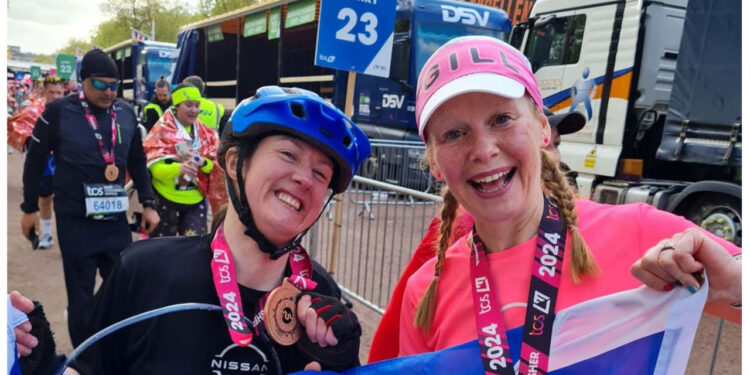A woman with cerebral palsy who became the first female frame runner to complete the London Marathon described reaching the finish line as “surreal.”.
Dr. Julie McElroy, 38, of Glasgow, finished the marathon in five hours and 59 minutes on Sunday, accompanied by her support runner Gill Menzies, who described it as a “huge privilege” and a “massive challenge.”.
Dr. McElroy began frame running approximately three years ago after suffering a catastrophic injury and has since completed a number of events, including the Paisley 10K and the 22.6-mile Glasgow Kiltwalk.
A frame runner is a three-wheeled frame that supports the athlete with a saddle and body plate, allowing them to pedal with their feet.
“It was a surreal experience, and I feel like I’ve been in a dream for the last few weeks training for it,” Dr. McElroy told PA News.
“I was in the saddle for almost six hours (on Sunday), which was perhaps the longest time I’ve ever been on my frame.
“The day arrived, and I was calm, not nervous, and pretty collected when I walked in.”
“I knew I had the mental capacity, but it was the physical, because you never know how your body is going to react.”
She stated that she was “quite worried” she wouldn’t cross the finish line “because 26.2 miles is quite a long distance.”.
“I’m just glad I did it in five hours and 59 minutes; I’m quite pleased with that time,” she went on to say.
Dr. McElroy stated that the most difficult part of the marathon occurred around the 16-mile mark, just over halfway through.
“The hardest part was when I got to the 16-mile mark; some people told me that’s the hardest part because it did get quite tiring,” she informed me.
“That’s where I struggled most, so my support runner Gill topped me up with more energy, like sweeties and jelly babies, to keep me going.”
She also mentioned that navigating between the runners on the route was difficult due to her size.
“My frame goes quite fast, so I was worried about tripping people up,” she went on to say.
“I had my support runner Gill there to help me move other runners out of the way because then I had space to run.”
Dr. McElroy believes that her challenge would encourage others with impairments to take up frame running.
“I hope people will get out there and participate in sports. Try frame running; it’s a terrific sport that has had a positive impact on me in recent years.
“Six years ago, I had a serious traumatic injury, and I never thought I would be running the London Marathon.”
Gill Menzies, 51, Dr. McElroy’s support runner, said she was “so delighted” for her when she crossed the finish line.
“She was pretty exhausted for the second half, and it was a case of using every mental tactic because I was desperate for her to finish in under six hours, and we made it with 29 seconds of grace,” Ms. Menzies, who hails from Edinburgh, told PA.
“Her frame is larger than a typical runner’s, so there is a serious risk of her running over people or people stumbling into the frame.”
“I sprinted about a meter in front of her, turning my head every few seconds to see if she was okay.
“It was a huge privilege and a massive challenge all at the same time.”
She went on to say, “I really hope Julie running the London Marathon raises the profile of frame running for disabled runners and what’s actually possible.”
Dr. McElroy has been raising donations for the Richard Whitehead Foundation, which was established by British athlete Richard Whitehead, MBE, who races on prosthetic legs.










